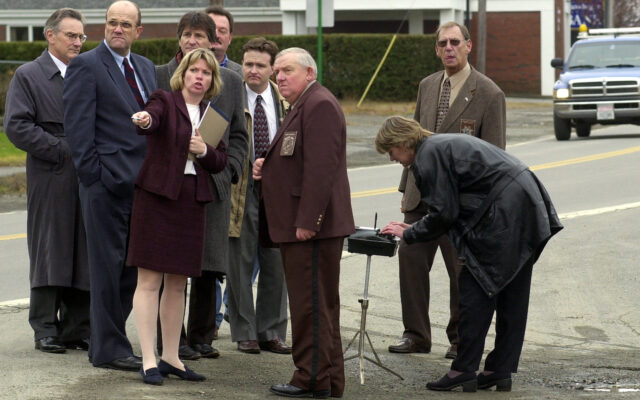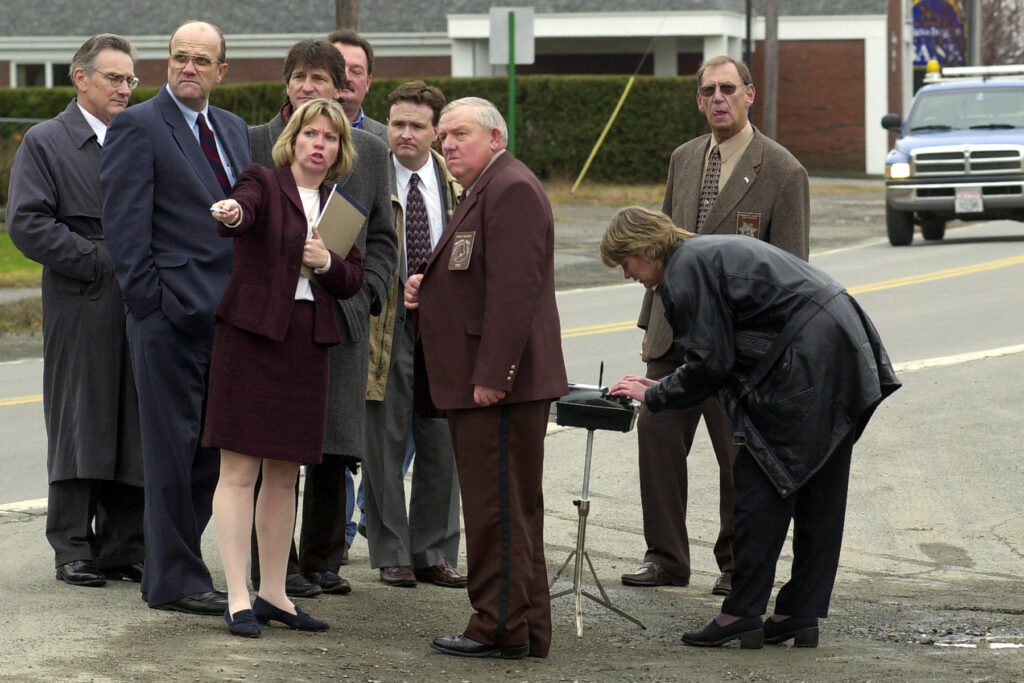
As another Maine court reporter retires, a digital recording system will replace her
By Judy Harrison, Bangor Daily News Staff
Maureen Whitehouse likes to hear the whole story. That’s why she spent nearly 40 years in Maine courtrooms as a court reporter creating detailed transcripts of legal proceedings.
“It’s a hard, hard job,” she said.
Whitehouse, 61, of Bangor recently retired from full-time work as a court reporter for Maine’s court system. She’s part of a vanishing breed, as a court reporter who uses a stenographic machine in trials and other proceedings to take down every word uttered.
Over the past decade, courts in Maine and across the nation have reduced the number of court reporters they employ, in part because fewer people are entering the profession. Today, Maine’s court system employs just four court reporters who attend proceedings across the state, down from 21 when Whitehouse began in 1983. In another 15 years, Maine’s judiciary most likely will employ no court reporters.

RETIRING COURT REPORTER — Court reporter Maureen Whitehouse, far right, is shown working at a site visit during a 2001 murder trial. Whitehouse has retired. Her position will be filled by a digital recording system as the number of court reporters dwindles in Maine and the nation.
That deeply saddens Whitehouse, who will continue working as a freelance court reporter in her retirement.
It also concerns others who depend on the accuracy of court transcripts to prosecute cases, defend clients and appeal judgments and sentences to the Maine Supreme Judicial Court. They worry that transcripts that out-of-state transcription services are less accurate than those court reporters produce.
“I care about the record. That’s my only job,” Whitehouse said. “To do this hard job, you have to want to preserve the record.”
Mark Rucci, deputy district attorney for Penobscot County, has seen problems with transcripts produced from recordings by out-of-state transcription services. One transcript from a recorded court proceeding, for example, reported the opposite of what the judge said by missing a qualifying term.
“My experience with the court reporters is that they are uniquely skilled and uniformly professional,” he said. “In my opinion, they produce a superior and more accurate product by virtue of the fact that they can tell attorneys and witnesses to slow down or speak up, can stop proceedings to catch up, and can clarify terms on input of counsel. In addition, they can easily follow counsel into chambers to put proceedings on the record.”
Accurate transcripts are essential to the work of York lawyer Rory McNamara, who handles many criminal appeals to the Maine Supreme Judicial Court.
Court reporters can capture contextual information such as how a witness gestures and whether a sidebar is held in a hallway or the courtroom, McNamara said. Transcripts from court reporters also contain fewer entries labeled “unintelligible,” he said.
“Also, local knowledge matters,” McNamara said. “For example, folks [out of state] don’t know what Passadumkeag is, let alone how to spell it. That creates some curious entries in transcripts.
“Maybe I’m able to fill in the holes with my knowledge, but it’s likely that sometimes out-of-towners confabulate — they transcribe what they think they hear, not what’s being said. Locals know what Reny’s is, and I’m able to trust that that’s what was said in court.”
Whitehouse has been producing transcripts since her first day on the job, July 5, 1983, after she earned a bachelor’s degree from what is now Husson University.
She has made the record in hundreds of criminal and civil trials, taking down what judges, lawyers and witnesses said. Whitehouse has sat through hundreds more motion and sentencing hearings. She has taken her machine on tours of homicide sites and into courthouse hallways for sidebars. Whitehouse can work for eight hours without electricity while courtroom recording systems cannot.
In retirement, Whitehouse said, she will focus on her family and her artwork, though she will be available to cover trials in Bangor and surrounding counties. But she won’t have to travel as much as she did while working full time.
She attributes her skill as a stenographer, in part, to eight years of piano lessons.
“Of the seven people who graduated with me, four of them played the piano,” she said. “I had a friend who could type 96 words a minute on a typewriter but couldn’t do this job.”
While the machines court reporters use have been computerized over the years, the keyboard on them has not changed in about 100 years.
The stenotype keyboard, initially designed as a shorthand machine, has far fewer keys than a conventional computer keyboard. Court reporters can press multiple keys on the stenograph machine simultaneously to spell out whole syllables, words and phrases with a single hand motion.
The top two rows represent consonants, and the bottom row is vowels. The court reporter types the beginning consonants of words with the left hand and ending consonants with the right hand. The reporter uses thumbs on the vowel keys. An expert stenographer can capture about 300 words a minute.
Court reporters purchase and maintain their own equipment.
Whitehouse’s first machine printed the letters on a narrow paper and cost $600. The first computerized system she bought cost $21,500, which was half of what she paid for her house. The monthly payments were higher than her mortgage payments, Whitehouse said.
Maine’s district courts started using magnetic reel-to-reel tape recording systems in the 1970s while court reporters worked mostly in superior courts, according to Rick Record, director of court services for the state court system. The reel-to-reel systems were replaced by cassette tapes in the 1990s. The court system began installing digital recording systems in 2014.
“Virtually all court events are electronically recorded in Maine’s nearly 100 courtrooms,” Record said. “Each courtroom is outfitted with For the Record recording software as well as the computer, microphones and a sound mixer to operate it. The cost of this equipment was about $5,000 per courtroom at the time.”
The system’s seven court technology assistants operate the equipment.
While court reporters cost the court system about $110,000 a year in salary and benefits, Record said, court technology assistants cost about $70,000.
Lawyers order transcripts of proceedings directly from court reporters and pay them rather than the court system. The court system set the cost at $3 per page, and that has not changed in about 20 years, according to Whitehouse.